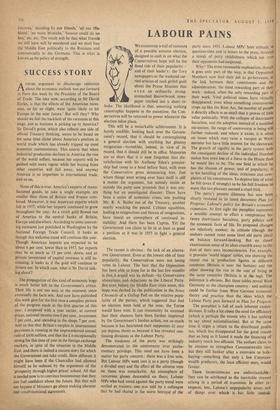SUCCESS STORY
AFRESH argument to discourage optimism about the economic outlook was put forward in Paris this week by the President of the Board of Trade. The idea now, according to Sir David Eccles, is that the effects of the American reces- sion, so far so slight, were 'quite likely to hit Europe in the near future.' But will they? Why should we feel the backlash of the recession at this stage, just as business is picking up in America? Sir David's point, which also reflects one side of official Treasury thinking, seems to be based on the same tired cliché about America's position in world trade which has already tripped up most economic commentators. This asserts that when industrial production declines in America the rest of the world suffers, because her exports will be pushed with more vigour while her buying from other countries will fall away, and anyway America is so important in international trade, and so on.
None of this is true. America's exports of manu- factured goods, to take a single example, are smaller than those of Britain and France com- bined. Moreover, it was American exports which fell in 1957, while her imports continued to grow throughout the year. As a result gold flowed out of America to the central banks of Britain, Europe and elsewhere. According to some interest- ing estimates just published in Washington by the National Foreign Trade Council, it looks as though this welcome trend will continue this year. Though American imports are expected to be about 6 per cent, lower than in 1957, her exports may be as much as 15 per cent. down, and as private investment of capital overseas is still in- creasing, it looks as if the gold will continue to stream out. In which case, what is Sir David talk- ing about?
The propagation of this kind of economic bogy is much better left to the Government's critics. Their life is not too easy at the moment, since eventually the facts win. And new facts published this week give for the first time a complete picture of the progress made in the first quarter of this year. Compared with a year earlier, at current prices, national income rose 6 per cent., investment 7 per cent., and spending in the shops 7 per cent. Add to this that Britain's surplus in international payments is running at the unprecedented annual rate of £450 million, and that the £ is exceptionally strong for this time of year in the foreign exchange markets, in spite of the situation in the Middle East, and there is indeed a success story for which the Government can take credit. How different it might have been if the Chancellor had allowed himself to be seduced by the arguments of the 'prosperity through higher prices' school. All that is needed now is to convince businessmen that they can feel confident about the future. But that will not happen if Ministers go about making alarmist and unsubstantiated statements.






























 Previous page
Previous page